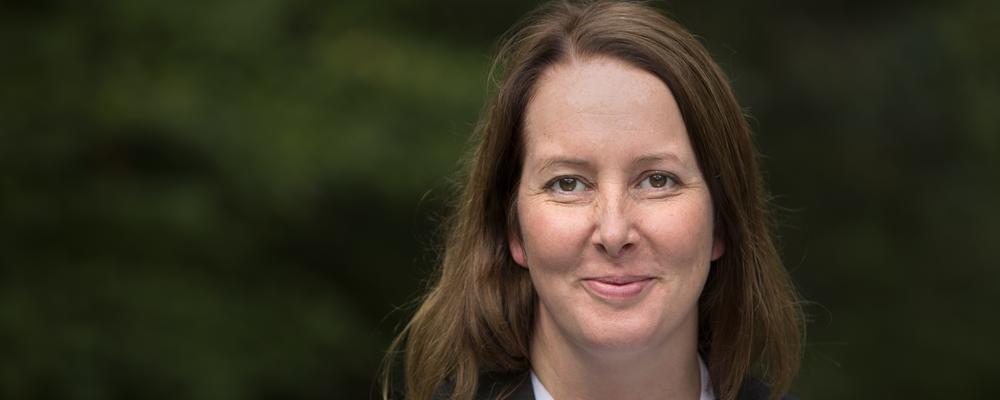
- Home
- Research
- Find research
- Elin Naurin wants to increase the awareness of the political consequences of pregnancy
Elin Naurin wants to increase the awareness of the political consequences of pregnancy
Elin Naurin is an Associate Professor at the Department of Political Science. Her research is on political effects of pregnancy and childbirth. She is also Wallenberg Academy Fellow.
What's your research about?
'My most recent area of expertise centres around the effects of pregnancy, childbirth and parenthood on individuals’ views of society. This is the area for which I recently received the so-called Wallenberg Academy Fellowship. The question in focus is: How does becoming pregnant and giving birth affect individuals politically?'
'Although pregnancy is a process that is life-changing for the woman and inherently relevant for the people and society surrounding her, political scientists have rarely regarded it as a process of political importance. Therefore, the political conclusions that women and their partners draw from their experiences with pregnancy and childbirth are severely under-studied. For a field like political science—whose ambition is to understand political behaviour and opinion formation—this is an obvious gap that needs to be filled and it will be filled in this project.'
'The project develops a comprehensive theory on the effects of pregnancy on individuals’ political development. The project develops a comprehensive theory on the effects of pregnancy on individuals’ political development. Hypotheses are tested using two panel studies where large groups of Swedish women and partners are followed over time. Detailed analyses of different groups over detailed stages of pregnancy and childbirth, as well as long term analyses months and even years after birth, will be performed.'
Why is this so interesting?
'On average in EU countries, around 6 percent of women aged between 20 and 45—some 5 million women—give birth to a child each year. Most of these women become pregnant more than once during their lifetime, and most have partners. These groups are clearly large enough to affect outcomes of elections and their experiences have clear societal importance. Since pregnancy, childbirth and early phases of parenthood always lead to increased contact with society’s social services they are certain to have political implications for the individual. Moreover, they are obvious candidates to explain gender differences in political behaviour.'
'And while there are studies on the more general role of parenthood in politics, those can rarely track detailed developments over time.' 'Furthermore, while researchers agree that biological factors such as health and genes matter greatly for political behaviour, they are oblivious to the impact of the most noticeable physical transformations of women: pregnancies, childbirths and breast-feeding. And while there are studies on the more general role of parenthood in politics, those can rarely track detailed developments over time and therefore often lack the ability to disentangle mechanisms behind detected effects.'
'Taken together, research on public opinion and political behaviour should not—and will not when this project is finished—remain ignorant of the political consequences of pregnancy, childbirth and the early phases of parenthood.'
How did you become interested in this subject?
'I am a political scientist with a genuine interest in political behaviour and public opinion. When I became pregnant and gave birth to my first child, I realized that my field did not have answers to the questions that arose in me during this period. I got in contact with scholars in my position in midwifery and realized that they also lacked the societal discussions in their field.'
'Over several years, I developed the idea in parallel to my other research and built up a research collaboration between political scientists and medical scholars. The hospital is a very public place, and the role of society is obvious there. At the same time the individual and her personal situation is absolutely central. It is very inspiring to be a political scientist in this environment.'
What are you studying right now?
'Right now, I’m starting up a panel study at the Sahlgrenska University Hospital where we hope to recruit respondents in the waiting room of the ultra sound clinic. I also study my existing data from the Citizen Panel (conducted at the SOM Institute, University of Gothenburg). For example, I study how pregnant women and their partners change their intake of political information when they become pregnant and give birth to a child.'
'I also study how perceptions of gender change when you become pregnant. I also study how perceptions of gender change when you become pregnant, as well as what emotions are evoked during pregnancy and how this relates to your participation in societal issues.'
What has been the best moment or highlight in your research career so far?
'I am enthusiastic about working cross-disciplinary with medical scholars. I feel genuinely humble and proud to be able to connect political science to midwifery and obstetric research. I am also very happy about the opportunities that the Wallenberg Academy Fellowship offers me, as well as the other external funding I have received over the years.'
How can your research benefit society?
'I am happy to be able to raise awareness for political consequences of pregnancy. Pregnancy is disturbingly under-theorized and under-studied as a political process. The inter-disciplinary character of the project means that it will create awareness of the effects of pregnancy among political scientists, but also that the societal roles of pregnancy will be clarified to midwifery and obstetrics studies, something that has long been missing.'
'I am happy to be able to raise awareness for political consequences of pregnancy.' 'Taken together, the knowledge gained in this project will sensitize the scientific community and the broader public to the impact of the political effects of pregnancy, ultimately—obviously—with the aim also to contribute to equal participation in politics as well as a firm acknowledgment of the political relevance of expecting and giving birth to a child.'